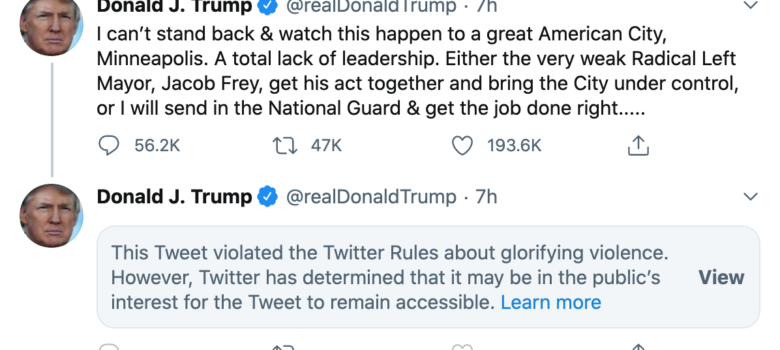U.S. President Donald Trump yesterday signed an executive order targeting Internet platforms after Twitter fact-checked one of his tweets on mail-in voting (the company followed up with a warning on another tweet earlier today involving glorifying violence). The order cannot simply reverse current U.S. law, but it encourages U.S. regulators to rethink how the Internet safe harbour provisions that limit liability for Internet platforms for third party content are implemented.
While the U.S. is obviously free to assess its statutory approach, one issue that received little attention is that the U.S. has effectively locked itself into the safe harbour system through its trade agreement with Canada and Mexico. The inclusion of safe harbour provisions in the agreement were viewed by some as an attempt to force Canada to adopt similar rules, yet the more likely reason for lobbying on the issue was to ensure that the U.S. itself was bound by the rules. Indeed, there were last minute efforts to remove the provision from the final deal, but those were ultimately rejected.
The end result is that Article 19.17 of the USMCA features a provision that largely mirrors current U.S. law:
1. The Parties recognize the importance of the promotion of interactive computer services, including for small and medium-sized enterprises, as vital to the growth of digital trade.
2. To that end, other than as provided in paragraph 4, no Party shall adopt or maintain measures that treat a supplier or user of an interactive computer service as an information content provider in determining liability for harms related to information stored, processed, transmitted, distributed, or made available by the service, except to the extent the supplier or user has, in whole or in part, created, or developed the information.
3. No Party shall impose liability on a supplier or user of an interactive computer service on account of:
(a) any action voluntarily taken in good faith by the supplier or user to restrict access to or availability of material that is accessible or available through its supply or use of the interactive computer services and that the supplier or user considers to be harmful or objectionable; or
(b) any action taken to enable or make available the technical means that enable an information content provider or other persons to restrict access to material that it considers to be harmful or objectionable.
4. Nothing in this Article shall:
(a) apply to any measure of a Party pertaining to intellectual property, including measures addressing liability for intellectual property infringement; or
(b) be construed to enlarge or diminish a Party’s ability to protect or enforce an intellectual property right; or
(c) be construed to prevent:
(i) a Party from enforcing any criminal law, or
(ii) a supplier or user of an interactive computer service from complying with a specific, lawful order of a law enforcement authority.
I have written how the provision benefits freedom of expression in Canada, noting that the absence of a Canadian safe harbour rule has meant the same companies that require court orders before the removal of content for claims originating in the U.S. frequently take down lawful content in Canada based on mere unproven allegations due to fears of legal liability. The Trump executive order purports to support free speech, but the Canadian experience suggests that if the safe harbours were dropped entirely they would have the opposite effect of increasing content removal. At most the order could spark another review of the rules, but Trump’s own trade deal, which is set to take effect by the summer, may severely limit future reforms given that it commits the U.S., Canada, and Mexico to the long-standing U.S. approach on Internet platform liability.








So this clause could further reinforce US First Amendment and Charter Section 2 provisions re: freedom of speech?
(I wish I knew the Mexican counterpart-law…)
I hope that when Biden comes along, he obliterates both section 230 of the Communications Decency Act *and* brings Trudeau and AMLO together for a meeting to remove this odious section of the new NAFTA.
It’s long overdue that these wild west cesspools like Twitter, YouTube and Facebook be held accountable as purveyors of hate and lies for money. Zuckerberg in particular should be criminally charged.
The First Amendment is outdated. Look how it got warped with the Citizens United case. Money is not speech and neither is hate. The whole world needs a Fairness Doctrine and to emulate Section 86a of the German Criminal Code, and ban hate speech altogether. If it cripples the Internet, so be it. The world got along without it for centuries. Nothing of value would be lost.
Given how, historically, attempts to lock down the Internet (usually in relation to peer-to-peer file sharing) have resulted in more decentralized systems, that’s not a good idea.
Same reason the NSA were against SOPA and PIPA. They recognized that the push to try to kill copyright infringement would provide a strong selective pressure to get ALL Internet traffic encrypted and decentralized and make it much harder for them to do their job in legitimate cases.
I’m always reminded of this quote:
…or, as I as a programmer like to put it , “there is no such thing as a technological solution to a social problem”.
Pingback: ● NEWS ● #michaelgeist ☞ Why the #USMCA Locks in the #Internet Plat… | Dr. Roy Schestowitz (罗伊)
Pingback: What Is Section 230 and Why Did President Trump Attack It? - Netopia Netopia
Pingback: News of the Week; June 3, 2020 – Communications Law at Allard Hall